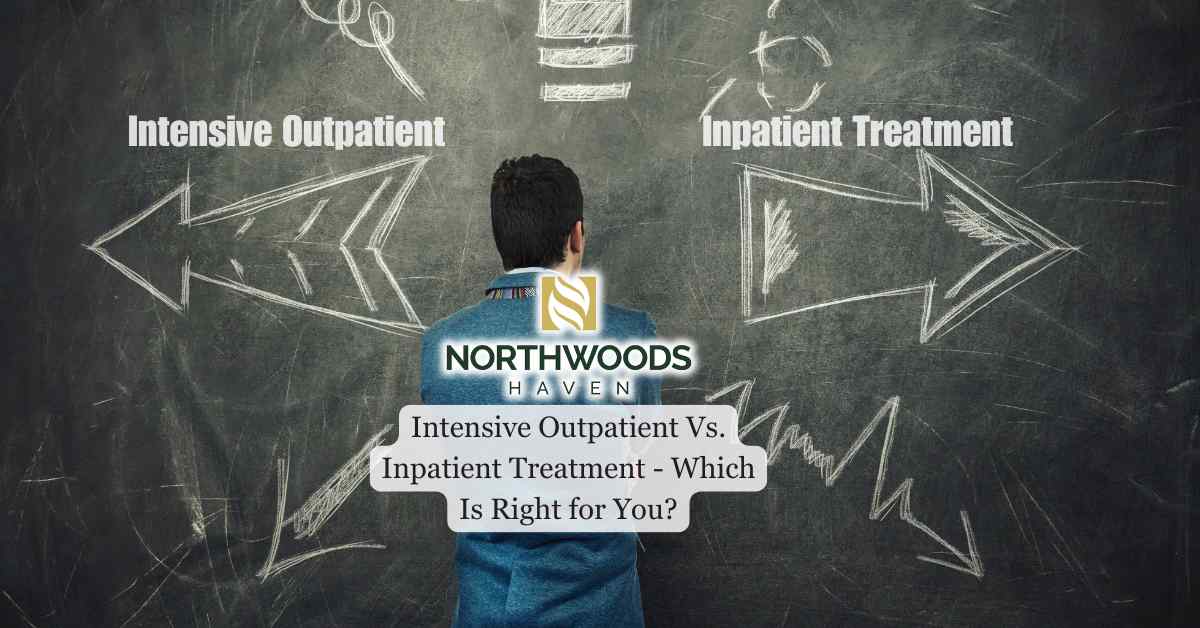When deciding between intensive outpatient programs (IOPs) and inpatient treatment for mental health or substance use disorders, it’s important to understand the key differences and advantages of each option. Both treatment types aim to provide effective care but are designed to meet different needs and situations.
This article highlights the main distinctions between these two treatment programs, their benefits, and the factors to consider when choosing the right approach for you.
Understanding Treatment Options
Inpatient treatment provides a structured, residential environment where you receive 24-hour care and support, making it ideal for severe cases requiring intensive supervision and detoxification. On the other hand, outpatient care allows you to maintain daily responsibilities while attending therapy sessions, suitable for those with moderate mental health challenges or substance use disorders.
Intensive outpatient programs (IOPs) bridge the gap between inpatient treatment and traditional outpatient care. These programs offer a more structured approach with multiple weekly sessions, providing the support you need without requiring a full-time residential commitment.
Northwood Haven Recovery’s Intensive Outpatient Programs allow individuals to receive care while still participating in personal life activities.
Level of Care Comparison
Inpatient treatment offers round-the-clock supervision and support, making it ideal for those with severe conditions requiring constant medical attention. In contrast, outpatient programs, such as IOP, provide more flexibility, allowing you to maintain daily responsibilities while receiving structured therapeutic support through 3-5 weekly sessions.
The decision between inpatient and outpatient care should be guided by professional assessments that take into account the severity of your condition, withdrawal symptoms, and available support systems. Inpatient treatment is typically recommended for acute conditions, while IOP is geared towards those needing less intensive support.
Keep in mind that inpatient programs generally have fixed durations, whereas IOP timelines are more adaptable to individual recovery needs.
Read more about What to look for in an IOP for addiction treatment.
Flexibility and Lifestyle Impact
IOPs offer more flexibility, allowing you to maintain your daily life and personal responsibilities while receiving structured support. You’ll typically spend 9 to 20 hours per week in therapy sessions, leaving time for work, school, or family obligations. This flexibility can boost your motivation and commitment to recovery, as you can apply learned coping skills in real-life situations outside of treatment.
On the other hand, inpatient treatment requires you to reside full-time at a facility, significantly disrupting your daily life and routines for the duration of the program. While this controlled environment provides 24/7 supervision, which may be necessary for severe conditions, it also limits your personal freedom and autonomy.
Learn more details regarding How long an IOP lasts.
Cost Considerations
Inpatient treatment tends to be more expensive, often exceeding $1,000 per day due to the round-the-clock medical supervision and comprehensive care provided in a residential setting.
Whereas, outpatient programs are generally more affordable, with average session costs ranging from $100 to $300, making them a budget-friendly option for many individuals. Intensive Outpatient Programs (IOP) usually fall in the middle, costing between $250 to $600 per week.
Insurance coverage also plays a significant role in cost considerations. Inpatient services often require pre-authorization, while outpatient and IOP services may have different coverage levels, affecting your out-of-pocket expenses.
It’s essential to check with your insurance provider to understand your specific benefits and limitations. Additionally, financial assistance options, such as sliding scale fees and grants, may be available to help offset the costs of both inpatient and outpatient treatment programs.
Factors to Consider When Choosing Between Inpatient and IOP
When selecting between inpatient and intensive outpatient treatment, you must carefully evaluate the severity of your condition and the level of support you require.
Severity of Condition
If you’re experiencing severe symptoms, such as life-threatening addictions or acute mental health crises, inpatient care is typically recommended. This level of care provides a structured, controlled environment for stabilization and intensive treatment.
On the other hand, if your condition is less severe and you can maintain stability in your daily life, outpatient programs may be more suitable. IOPs offer structured support while allowing you to fulfill work or family responsibilities.
However, it’s essential to undergo professional assessments to determine the appropriate level of care, as mismatched treatment can increase the risk of relapse and hinder your recovery efforts.
When making this decision, consider not only the current severity of your symptoms but also your overall functioning and the presence of a supportive home environment conducive to recovery.
A history of relapse or insufficient support systems may necessitate inpatient treatment to ensure the best possible outcome for your unique situation.

Support Systems
If you have a stable home environment with supportive family and friends who can reinforce the coping skills you learn during treatment, outpatient programs may be a suitable option. They offer the flexibility to maintain work and family responsibilities while engaging in therapy.
However, if you lack a robust support system or struggle to avoid triggers and substances independently, inpatient treatment programs might be the safer choice. Inpatient care can be particularly beneficial if you need to focus solely on your recovery without the distractions of daily life.
Personal and Professional Obligations
If you have ongoing responsibilities, such as work, school, or family commitments, an IOP may be the better choice. Outpatient treatment options, including IOP, offer the flexibility to schedule sessions around your existing obligations, allowing you to maintain a sense of normalcy in your life.
In contrast, inpatient treatment typically requires a full-time commitment, which may necessitate taking a leave of absence from work or school, making it less feasible if you have pressing personal or professional responsibilities.
However, if your condition is severe and you need more intensive care, the structure of inpatient treatment may be necessary, even if it means temporarily putting your obligations on hold.
Financial Considerations
Inpatient care typically incurs higher costs, averaging over $1,000 per day due to 24/7 medical supervision and comprehensive services.
Outpatient treatment costs range from $100 to $300 per session, with IOPs costing between $250 to $600 per week. While more affordable than inpatient care, IOP still requires a significant financial commitment.
Insurance coverage for inpatient and outpatient services varies widely, so it’s crucial to verify your benefits beforehand. Inpatient treatment often requires pre-authorization and may result in higher out-of-pocket expenses.
Financial assistance options, such as sliding scale fees and grants, may be available to help offset treatment costs, particularly for outpatient or IOP services. When evaluating the overall financial impact, consider budgeting for additional expenses like transportation and medications.
Final Thoughts from Northwood Haven Recovery
Deciding between inpatient and intensive outpatient treatment for substance use disorders or mental health conditions requires careful consideration of all mentioned factors.
When choosing between these two options, it is essential to consult with an addiction professional who can assess the severity of the condition, evaluate the patient’s support network, and consider their overall situation. The ultimate goal is to select the level of care that provides the necessary structure and support for the individual to achieve and maintain long-term recovery.
Northwood Haven Recovery’s Intensive Outpatient Programs for substance addiction treatment will help anyone struggling with substance abuse to navigate the challenges of sobriety and reclaim their life.



